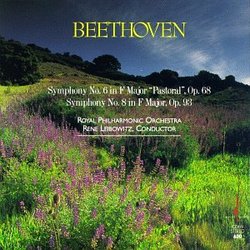| All Artists: Ludwig van Beethoven, René Leibowitz, Royal Philharmonic Orchestra Title: Beethoven: Symphonies 6 & 8 Members Wishing: 0 Total Copies: 0 Label: Chesky Records Release Date: 6/23/1994 Genre: Classical Styles: Historical Periods, Classical (c.1770-1830), Modern, 20th, & 21st Century, Symphonies Number of Discs: 1 SwapaCD Credits: 1 UPC: 090368006929 |
Search - Ludwig van Beethoven, René Leibowitz, Royal Philharmonic Orchestra :: Beethoven: Symphonies 6 & 8
 | Ludwig van Beethoven, René Leibowitz, Royal Philharmonic Orchestra Beethoven: Symphonies 6 & 8 Genre: Classical
|
Larger Image |
CD Details |
CD ReviewsPASTORAL BEETHOVEN Melvyn M. Sobel | Freeport (Long Island), New York | 01/10/2003 (4 out of 5 stars) "Fine, transparent and well-honed performances by Leibowitz and the Royal Philharmonic Orchestra from 1961 London sessions, under the keen production reins of Charles Gerhardt. There is a keen sense of repose, skillfully blended with an ongoing rusticity, that highlights Symphony No. 6 in the most charming and attractive way. The trilling high in the violins at the opening of the second movement, for example, delights; the pointed, almost concertante deliberation between strings and winds that quickly follows is masterful, yet sweet. The third movement's "merry-making" is deliciously, and ominously, underscored by the oncoming threat of foul weather--- and what a thunderstorm it is! Leibowitz rips into this like one possessed, and it works. The rain pours, lightning skewers the sky, thunder shakes the earth. Well done! Then the last movement apotheosis becalms, leaving us as thankful as shepherds in the country. Symphony No. 8, recorded just days after No. 6, keeps the momentum flowing. The first movement's opening orchestral flourish sets the tone. No holds barred here; all stops pulled. Leibowitz hurls the symphony headlong throughout. It's a whirlwind of joyous abandon, and positively contageous. I doubt I've heard a more energized or exciting performance. Under Leibowitz, the RPO plays brilliantly and, yet, often with great warmth. The sound, remarkably, is full, spacious and clear, with not a hint of edge to the upper strings, and plenty of bloom at the bass end. [Running time: 67:09]" Vintage Leibowitz Patrick A Daley | Fredericton, New Brunswick | 02/20/2002 (5 out of 5 stars) "Beethoven's 6th Symphony was composed about the same time as the ubiquitous 5th Symphony. They were evidently a pair, and apparently, both works were first performed during the same concert on December 22, 1808, given in the Theater and der Wien. The Sixth is of quite a different character than the famous Fifth, and was subtitled "A Recollection of Country Life." It is now usually known as the "Pastorale Symphony." Beethoven's picture of country life seems to ignore the hard work, and instead offers a tourists' view: joyful feelings, peaceful scenery, gentle brooks, and merry peasant dances, although there is a wonderful thunderstorm which would have sent everyone scurrying for cover. One might choose, however, to ignore the programmatic associations and simply call the movements allegro ma non troppo, Andante molto mosso, Allegro, Allegro, and Allegretto. Either way, it is a very fine work. Leibowitz and the Royal Philharmonic gave this a straightforward performance, letting the music speak for itself. It is really a very endearing performance, and it would be hard to find a better one. The second movement is really very lovely, and the storm is very effective. This stands comparison with the very best, whether Bruno Walter, Ansermet, Karajan, or Boult.Beethoven's 8th Symphony was composed a few years later, along with the more dramatic 7th Symphony. The Eighth is the most whimsical of the Nine Symphonies, providing a mild satire on Beethoven's heavier music, with climaxes which never quite come off as serious, interspersed with whimsical lighter passages.This is far and way the best Eighth I have ever heard. Leibowitz and the Royal Philharmonic Orchestra brought out the humour in the music in a delightful way, as well as its wonderful symphonic structure. The recording quality (1961) is very fine indeed, as one would expect from the recording engineer, Kenneth G. Wilkinson. The upper strings sound quite smooth, and the stereo image is wide and deep. All in all, a very successful reissue of some great performances. I now have the whole set, and really, it is hard to beat the Leibowitz recordings of the Beethoven Symphonies."
|

 Track Listings (9) - Disc #1
Track Listings (9) - Disc #1